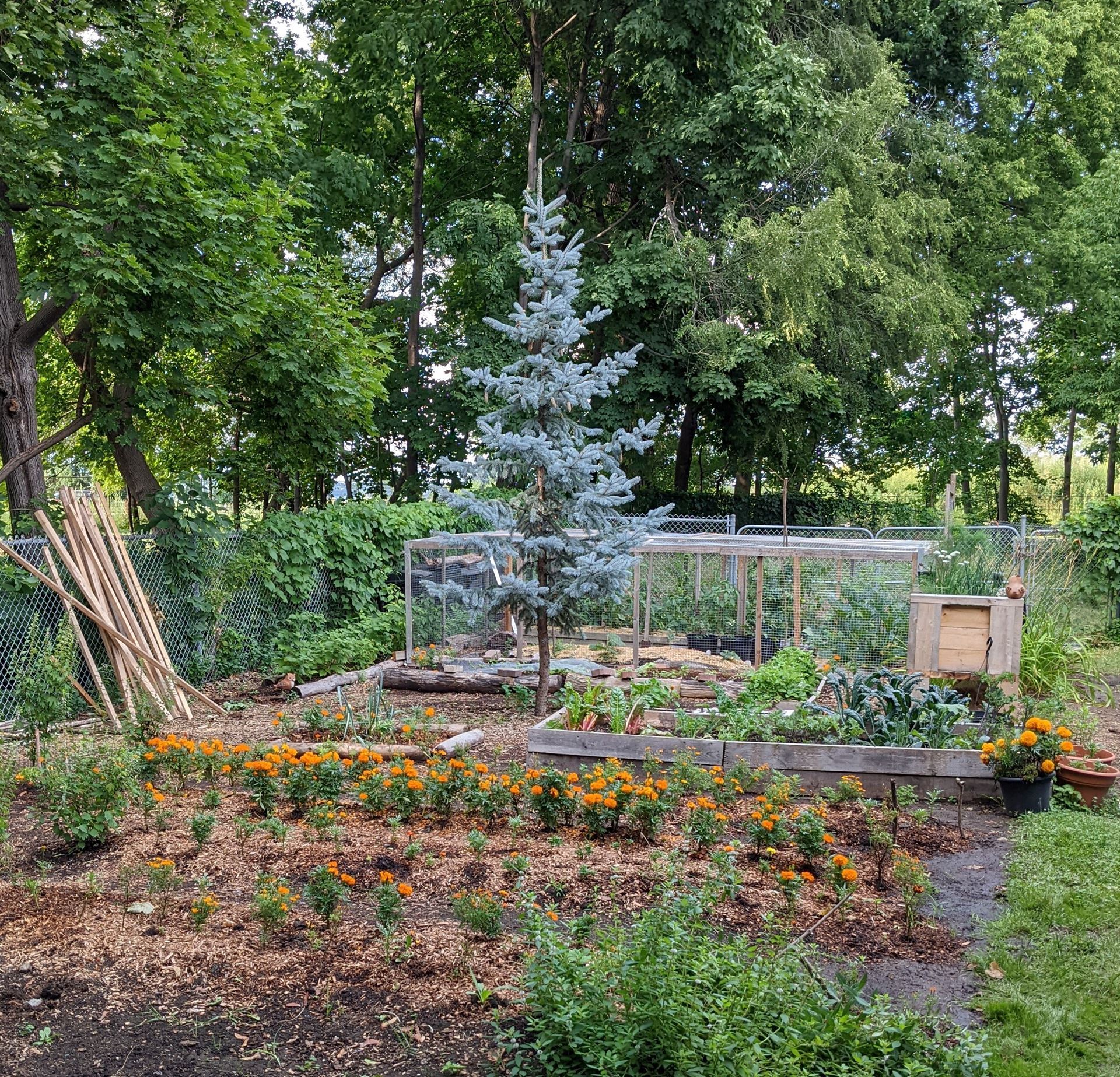2022 Greener Greenspace Profile
Ajashki Heart Garden
Located on the campus of the First Unitarian Congregation of Ottawa, the Ajashki Heart Garden is part of the Indigenous-led Ajashki Food Security and Climate Change Learning Centre.
Design and Process Ajashki* is an Indigenous-led Food Security and Climate Change initiative conceived by Elder Verna Mcgregor. The Learning Centre is the First Unitarian Congregation of Ottawa’s response to the Truth and Reconciliation Commission’s Call to Action, and other global goals to end poverty, reduce systemic racism and support sustainable development. In 2020, the greenspace that is now a garden was an empty space covered with mulch. A Blue Spruce, a young Catalpa tree, a clump of daylilies and another of irises grew amongst invasive species (dog strangling vine, goutweed and garlic mustard) growing through the mulch. Today, the garden is host to cultivated and wild food plants and herbs, and both perennial and annual ornamentals. The new plants have attracted a diversity of butterflies and bees. A collection of sticks and logs near the fence and a grassy area provides shelter for small animals and insects. Crows and raccoons have been observed in the trees near the garden. The understanding is that the garden and the harvest will always be shared with other animals. In the past few years, the soil quality has been improved by adding commercial compost. Recently, Ajashki acquired composters and established a relationship with an Ottawa food centre, to collect and compost the fresh food unsuitable for distribution. By the summer of 2023, compost made from this and the refuse from the garden will be used to support next year’s growth. Rain is collected in rain barrels to water during drier periods throughout the growing season. There are no chemical fertilizers, herbicides, insecticides or other chemicals used in the garden. All weeding, trimming and harvesting is done by hand or with low-technology tools such as rakes, shovels and trowels. The garden beds in the Ajashki gardens have been constructed with found or recycled materials. The vegetable plants were started from seed or were shared by other gardeners and plastic pots are recycled or returned to the owner. Two previously used (and donated) raised containers were successfully used to grow carrots and herbs. Physical barriers were used to try to deter crop destruction. Compost and mulch were used to feed the soil and to help keep moisture in the ground. Community Collaboration Ajashki is an Indigenous-led Food Security and Climate Change Project that aims to establish an Indigenous Learning Centre. Currently, the Food and Climate Change Educator, Kayoki Whiteduck, leads paid youth called Future Food Warriors (FFW) in caring for the outdoor gardens and indoor Growing Towers and provides information on climate change and mitigation. The program runs twice weekly from June to October and once a week during the winter months. The Ajashki Circle of Support consists of volunteers, many of whom spend time caring for the garden (e.g. watering between meeting days, assisting with construction, weeding and planting), preparing food from the garden and learning ecological and regenerative land care practices alongside the Indigenous and non-Indigenous youth. Food from the garden is shared with the local food centre, which is made available to the community at no cost. Greens, tomatoes, cucumbers, zucchini, carrots, kale and chard have supplemented the lunches provided for Future Food Warriors who are youth living with various challenges, including food insecurity. The youth partake in plant identification walks in and around the garden and have foraged for wild garlic mustard to make pesto. In addition, many folks from the nearby seniors’ residence walk through the garden and enjoy the changes that have and continue to occur there. Chairs (recovered from a neighbour’s trash) have been placed in the garden, and visitors are invited to sit and stay awhile. The City of Ottawa has declared a climate emergency and is developing climate change mitigation programs and policies. The Ajashki Heart Garden supports these programs and policies and is taking measures to reduce food insecurity and increase knowledge about regenerative urban farming. For more information about the Ajashi Heart Garden visit their website. Watch a presentation on the garden here - part of SOUL's 2023 Webinar Series on Ecological Land Care. *Ajashki means soil in the Algonquin language. |
 Photos c/o Ajashki Heart Garden |
Greener Greenspaces is a recognition program for sites from across Canada that exemplify greener greenspace stewardship. The aim of the program is to showcase examples of ecologically-focused land care as a means to inspire others and to further the movement across Canada.
See the full list of 2022 recognition recipients here


.JPG)